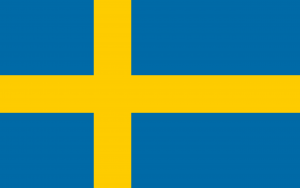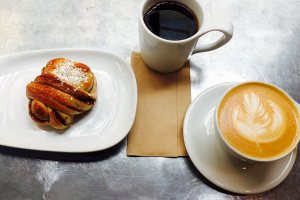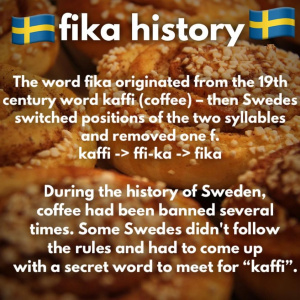Language/Swedish/Culture/Fika
 Հայերէն
Հայերէն Български език
Български език 官话
官话 官話
官話 Hrvatski jezik
Hrvatski jezik Český jazyk
Český jazyk Nederlands
Nederlands English
English Suomen kieli
Suomen kieli Français
Français Deutsch
Deutsch עברית
עברית हिन्दी
हिन्दी Magyar
Magyar Bahasa Indonesia
Bahasa Indonesia فارسی
فارسی Italiano
Italiano 日本語
日本語 Қазақ тілі
Қазақ тілі 한국어
한국어 Νέα Ελληνικά
Νέα Ελληνικά Şimali Azərbaycanlılar
Şimali Azərbaycanlılar Język polski
Język polski Português
Português Limba Română
Limba Română Русский язык
Русский язык Српски
Српски Español
Español العربية القياسية
العربية القياسية Svenska
Svenska Wikang Tagalog
Wikang Tagalog தமிழ்
தமிழ் ภาษาไทย
ภาษาไทย Türkçe
Türkçe Українська мова
Українська мова Urdu
Urdu Tiếng Việt
Tiếng ViệtFika concept
Fika is an integral part of the life of every Swede. Basically, fika simply means having a coffee. But it's so much more than that. It has been described as a social institution or even a phenomenon. Swedes love their fika. This gives them the opportunity to meet and hang out with friends.
Pronunciation
Fika [ˈfiːˌka]
Fika at work
In many workplaces, fika is part of the regular daily schedule. In the morning, a fika at 10:00 a.m. and in the afternoon at 3:00 p.m.
Among consensus-oriented Swedes, fika is a great way to exchange knowledge, opinions about what is going on in the company and, in general, to bond with your colleagues.
What's on the fika table
The cup of coffee is essential for a fika. But, of course, not everyone likes it. Having a tea, soda, or other drink instead is just as good.
Most Swedes combine their brake with pastry, called fikabröd. Some of the most popular include kanelbullar (cinnamon rolls), chokladbollar (chocolate balls) and cookies.
History of the word "Fika"
The word "fika" originates from the word kaffi (coffee) in the 19th century - then the Swedes changed the positions of the 2 syllables and removed an "f".
kaffi → ffi-ka → fika
During Swedish history, coffee has been banned several times. Some Swedes didn't follow the rules and had to find a secret word to meet for "kaffi".
Video - Swedish Fika (the unwritten rules)
Swedish Fika (the unwritten rules) 🇸🇪 - Learn Swedish



